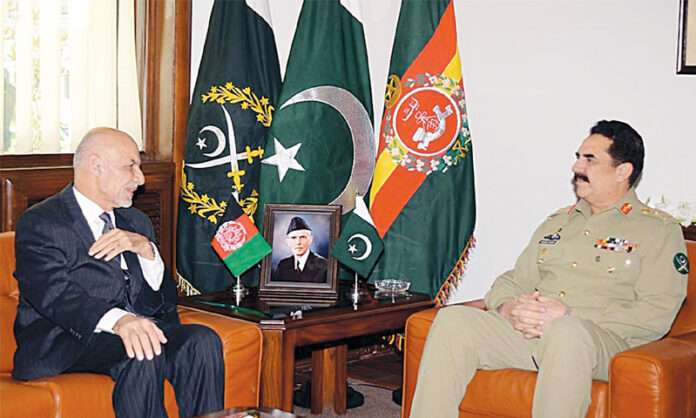The lack of economic opportunities for the populace in Afghanistan is a major impediment to peace and stability. Without an adequate industrial base and/or agriculture infra-structure, guns for hire in abundance as a means to finding income is neither conducive neither for foreign direct investment (FDI) nor domestic entrepreneurial initiatives. That a small elite cabal with fixed mindsets returned after the fall of the Taliban to occupy seats of power in Kabul does not help.
Economic resurgence for land-locked countries requires facilitating trade to and through their territory. EastWest Institute (EWI), a NY-based leading US think tank headed by Ross Perot Jr, initiated the “Abu Dhabi Process”, a cross-border trade dialogue co-funded by Abu Dhabi and Germany, between Afghanistan and the countries on its periphery. Hosted by EWI, the recent Istanbul conference encouraged businesses in South and Central Asia to themselves take necessary initiatives to unlock trade and kickstart the war-ravaged Afghan economy.
For the short term the recommended “ways forward” included (a) Regional Business Council comprising influential business leaders from Afghanistan, Pakistan, India, Iran, CARs, Turkey and Iran (b) one window custom clearance systems by Afghanistan and improved border sources at Torghundi, Hairatan, Torkham, Chaman, Wagah and Sher Khan Bandar and other border points to reduce time and cost of crossing (c) generous visa regime to enable businesses to move around easily (under SAARC for the short term and Economic Cooperation Organisation (ECO) for the long term) (d) regional entrepreneurship exchange programs to promote trade and investment opportunities.
The mid-term recommendations included (a) a unified transaction mechanism system and regional banking framework (b) standardizing Afghan tax structure to entice business investment and (c) a Free Trade Zone (FTZ) in Federally Administered Tribal Areas (FATA) of Pakistan. The long term recommendations were (a) a regional infrastructure trust fund (Donors: India, Turkey, China, Russia, Pakistan and Afghanistan) to invest on designing, developing & expanding transport means such as railways and (b) the implementation of CASA – 1000, TAPI Projects and regional energy projects (without mention by name of Iran-Pakistan-India (IPI) gas pipeline). The threat of US sanctions remain, and while Pakistan has no intention of bucking that, the Iranian portion is in place at the border at two places, 70 kms from Gwadar and 250 kms to connect into the extensive Pakistani gas pipeline infra-structure, with planned connections into FATA and Swat.
Recent significant and symbolic events confirm that Ashraf Ghani is a game-changer in the context of Pakistan-Afghanistan relationship. To quote “The Making of History” dated Nov 20, 2014, “Throwing aside diplomatic norms, the Afghanistan’s President visited GHQ immediately after landing at Islamabad. A foreign Head of State heading straight towards a military HQ on arrival carries a lot more than ceremonial importance, the Afghan President means business because he well understands where the real power concerning national security rests. Ashraf Ghani described his discussions later with the Pakistani PM as “a shared vision to serve as the heart of Asia, ensuring economic integration by enhancing connectivity between South and Central Asia through energy, gas and oil pipelines becoming a reality and not remaining a dream. The narrative for the future must include the most neglected of our people to become stakeholders in a prosperous economy in stable and peaceful countries, our faiths are linked because terror knows no boundaries. We have overcome obstacles of 13 years in three days, we will not permit the past to destroy the future.” How will the Afghan President overcome the hate Pakistani mindset of a few Kabuli diehards, some of these ingrates even born and educated in Pakistan, who must even now be conspiring to cut him down to size?
That the future would not be held hostage by the past was symbolised by the US repatriating (with Afghan consent) Latif Mehsud alongwith two other militant commanders from Bagram into Pakistani custody. My article, “Malala’s Theme”, of a year ago Oct 31, 2013, said, “The capture of the senior leader of Tehreek-e-Taliban Pakistan (TTP), Hakeemullah Mehsud’s No 2, by US Special Forces represents the “smoking gun” about the Afghan regime’s sustained involvement in terrorism in Pakistan. In the company of Afghan National Directorate of Security (NDS) agents taking their prized asset to Kabul to meet senior govt officials, Latif Mehsud was simultaneously on the American “most wanted list”. India’s Research & Analysis Wing (RAW), is using the NDS as a proxy to sustain and support TTP’s brutal campaign within Pakistan. To their credit, despite Karzai’s fury at the US for his capture (Daily Telegraph Oct 13, 2013) cut no ice with them, the US signalled that as their enemy Latif Mehsud would remain in their custody.” The act of handing over this terrorist is a confidence-building measure that will reduce the trust deficit and build on the excellent fast developing working relationship.
Realpolitik is the product of cold calculated pragmatism based on economics. Afghanistan will make billions of US dollars from system-collected royalties from the “Central Asian Corridor” passing through their geographical location. Without a continuous flow of gas and power, economic resurgence in Pakistan will remain moribund. The EWI’s Abu Dhabi Process emphasizes that the entire region stands to gain exponentially from constructive trade and commerce engagement.
Afghanistan has finally found its “man of destiny” in Ashraf Ghani. How long before some leader in Pakistan rises above self, selfishness and greed for the sake of the country?




